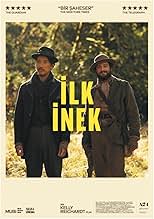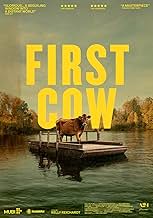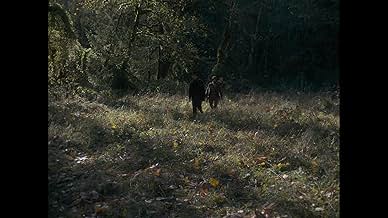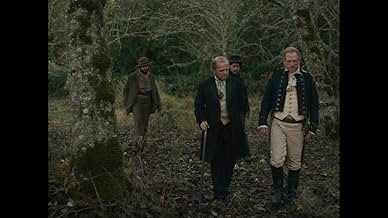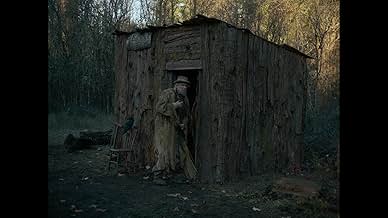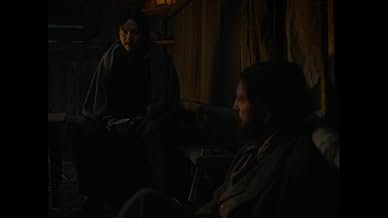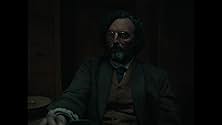IMDb-BEWERTUNG
7,1/10
23.466
IHRE BEWERTUNG
Ein gelernter Koch ist in den Westen gereist und hat sich einer Gruppe von Pelztierfängern in Oregon angeschlossen, obwohl er nur eine echte Verbindung zu einem chinesischen Einwanderer find... Alles lesenEin gelernter Koch ist in den Westen gereist und hat sich einer Gruppe von Pelztierfängern in Oregon angeschlossen, obwohl er nur eine echte Verbindung zu einem chinesischen Einwanderer findet, der ebenfalls sein Glück sucht.Ein gelernter Koch ist in den Westen gereist und hat sich einer Gruppe von Pelztierfängern in Oregon angeschlossen, obwohl er nur eine echte Verbindung zu einem chinesischen Einwanderer findet, der ebenfalls sein Glück sucht.
- Auszeichnungen
- 21 Gewinne & 141 Nominierungen insgesamt
Rene Auberjonois
- Man with Raven
- (as René Aubergenois)
Kevin Michael Moore
- Fort Trapper
- (as Kevin-Michael Moore)
Empfohlene Bewertungen
For those viewers who believe the pace of the film is "slow", yes, there are no car chases. Instead, this film has a depth of character and original development that creates a mood so beautifully of the time and place. It is refreshing to have a plot that keeps the viewer's interest throughout. When the majority of movie offerings out there are pure trash, this film is a real treat.
Not to put too fine a point on it, but Director Kelly Reichardt doesn't do plot driven movies. Still, FIRST COW is a feature where one has to be observant from the very first shot to the final one.
Reichardt's method of expression is to create a setting and fully immerse the viewer in it. Even though it's based on a novel by Jonathan Raymond (who also co-wrote the screenplay with the Director), FIRST COW isn't concerned with telling a tight knit tale, indeed the characters themselves seem to be exploring and creating their own "plot". They're own history. It's 1820s Oregon and two drifters, Cookie (John Magaro) and King-Lu (Orion Lee) end up in a small town with little at their disposal but some vague hope to keep on moving until they find themselves. The title animal comes to town and the pair find some short-term opportunity to use it's precious milk. Toby Jones is the owner of the Cow - and the richest man in the hamlet.
As is Reichardt's manner, the pacing is deliberate, her camera mostly steady (the movie is framed in the old fashioned 1:37 ratio) and the editing stately. She seems averse to making even the most intense situation palpable to the audience (her previous film, CERTAIN WOMEN, probably had cinema's least dramatic hostage sequences). Reichardt depicts the situation, and the viewer must create their own drama. It doesn't always work (WENDY AND LUCY), but, here as in OLD JOY, there is a vividness in the depiction that makes it worthwhile, if still not entirely satisfying.
Reichardt is an interesting talent and FIRST COW is an immersive dive into the old frontier (there is talk of going south towards the promised land of California and its emerging cities) even if it never quite strikes deep enough.
Reichardt's method of expression is to create a setting and fully immerse the viewer in it. Even though it's based on a novel by Jonathan Raymond (who also co-wrote the screenplay with the Director), FIRST COW isn't concerned with telling a tight knit tale, indeed the characters themselves seem to be exploring and creating their own "plot". They're own history. It's 1820s Oregon and two drifters, Cookie (John Magaro) and King-Lu (Orion Lee) end up in a small town with little at their disposal but some vague hope to keep on moving until they find themselves. The title animal comes to town and the pair find some short-term opportunity to use it's precious milk. Toby Jones is the owner of the Cow - and the richest man in the hamlet.
As is Reichardt's manner, the pacing is deliberate, her camera mostly steady (the movie is framed in the old fashioned 1:37 ratio) and the editing stately. She seems averse to making even the most intense situation palpable to the audience (her previous film, CERTAIN WOMEN, probably had cinema's least dramatic hostage sequences). Reichardt depicts the situation, and the viewer must create their own drama. It doesn't always work (WENDY AND LUCY), but, here as in OLD JOY, there is a vividness in the depiction that makes it worthwhile, if still not entirely satisfying.
Reichardt is an interesting talent and FIRST COW is an immersive dive into the old frontier (there is talk of going south towards the promised land of California and its emerging cities) even if it never quite strikes deep enough.
"It's the getting started that's the puzzle. No way for a poor man to start. ... You need capital, or you need some kind of miracle."
"You need leverage."
"Or a crime."
Another excellent Western from Kelly Reichardt, one with high production quality and which quietly subverts the genre's traditional themes. That starts with the two protagonists, King-Lu and Cookie (Orion Lee and John Magaro) who are rational, somewhat timid guys who hit on a plan to make a fortune via baked goods (yes, baked goods). Cookie is quite the domestic for the hero of a Western, and can crank out a clafoutis if necessary. The buddy he meets, King-Lu, is from China but is the antithesis of stereotypical representations, having traveled the world and multi-lingual, including English and the local Native American dialect. How fantastic is it that these guys aren't macho gunslingers, that they cook, sew, sweep the house, and forage while trying to figure out how to take advantage of this "land of riches." Meanwhile, the Native Americans themselves aren't blood-thirsty savages, they're people and they co-exist with the colonizers, which is reasonably accurate for the 1820's, a few decades before mass colonization would lead to genocide.
Despite the relative harmony, there is a quiet, rather ominous danger everywhere, from a bully in the fur trapping group promising to wait outside the fort after Cookie is paid to rob him, to King Lu describing how his friend was gutted from neck to loin because he was suspected of being a thief, to the more powerful men who debate how many lashes are appropriate in corporal punishment which is clearly at their discretion. There is no real law and order here, just force, and might makes right. At the same time, Reichardt is incredibly restrained in not showing a lot of violence, or reveling in it as a lesser director might have done.
Meanwhile, the message comes through that the West wasn't won with frontier spirit or some other aspect of mythical American exceptionalism, it was won with crime. Sure, the two mild-mannered fellas with big dreams steal milk from a rich guy's cow to make some delicious oily cakes, setting up a pop-up food stall (ok food blanket) that's quite popular with the locals, enriching themselves in the process. But the rich guy is stealing resources from the Native Americans and idiotically believes that the beaver can be trapped without limit. When he's told by King-Lu how vast the original beaver population was in the state, he can't extrapolate what greed will do to the population eventually, or doesn't want to (and indeed, the beaver was almost driven to extinction in Oregon). The little thieves end up in shallow graves, the big thief ends up likely lauded in the state's history, with a town probably named after him.
The first cow (fantastically played by Evie the cow btw) is thus a symbol of the natural order shifting, and in a profound way. Early on in a small saloon, one man remarks "This ain't a place for cows. God would've put cows here if it was." Another replies "No place for white men either then." It's notable that the cow is there so a rich man can have cream in his tea, and so he can display his status and sophistication to visitors who might look down on his rustic surroundings. It's a luxury, and reserved for him alone. It's the tip of an enormous iceberg, of many more white men with their precious possessions, of a lifestyle that will ravage the environment for the sake of personal wealth. In the opening shot in the present day, an enormous (and very ugly) cargo barge is seen going down the river. It's a shot I almost forgot by the time the film ended, but it seems to show in a subtle way the result of 200 years of such a lifestyle.
That's an aspect of Reichardt's direction I admire most, just how much she holds back and lets the viewer think about. There is a powerful message here, but it's delivered with great subtlety. Most of the scenes are played without a soundtrack in the background, and she doesn't feel a need to include shots to fill everything in for the viewer. There were places where I felt the film could have moved along a little more quickly and it won't be for everyone, but the more I thought about it afterwards, the more I appreciated what she had done.
Another excellent Western from Kelly Reichardt, one with high production quality and which quietly subverts the genre's traditional themes. That starts with the two protagonists, King-Lu and Cookie (Orion Lee and John Magaro) who are rational, somewhat timid guys who hit on a plan to make a fortune via baked goods (yes, baked goods). Cookie is quite the domestic for the hero of a Western, and can crank out a clafoutis if necessary. The buddy he meets, King-Lu, is from China but is the antithesis of stereotypical representations, having traveled the world and multi-lingual, including English and the local Native American dialect. How fantastic is it that these guys aren't macho gunslingers, that they cook, sew, sweep the house, and forage while trying to figure out how to take advantage of this "land of riches." Meanwhile, the Native Americans themselves aren't blood-thirsty savages, they're people and they co-exist with the colonizers, which is reasonably accurate for the 1820's, a few decades before mass colonization would lead to genocide.
Despite the relative harmony, there is a quiet, rather ominous danger everywhere, from a bully in the fur trapping group promising to wait outside the fort after Cookie is paid to rob him, to King Lu describing how his friend was gutted from neck to loin because he was suspected of being a thief, to the more powerful men who debate how many lashes are appropriate in corporal punishment which is clearly at their discretion. There is no real law and order here, just force, and might makes right. At the same time, Reichardt is incredibly restrained in not showing a lot of violence, or reveling in it as a lesser director might have done.
Meanwhile, the message comes through that the West wasn't won with frontier spirit or some other aspect of mythical American exceptionalism, it was won with crime. Sure, the two mild-mannered fellas with big dreams steal milk from a rich guy's cow to make some delicious oily cakes, setting up a pop-up food stall (ok food blanket) that's quite popular with the locals, enriching themselves in the process. But the rich guy is stealing resources from the Native Americans and idiotically believes that the beaver can be trapped without limit. When he's told by King-Lu how vast the original beaver population was in the state, he can't extrapolate what greed will do to the population eventually, or doesn't want to (and indeed, the beaver was almost driven to extinction in Oregon). The little thieves end up in shallow graves, the big thief ends up likely lauded in the state's history, with a town probably named after him.
The first cow (fantastically played by Evie the cow btw) is thus a symbol of the natural order shifting, and in a profound way. Early on in a small saloon, one man remarks "This ain't a place for cows. God would've put cows here if it was." Another replies "No place for white men either then." It's notable that the cow is there so a rich man can have cream in his tea, and so he can display his status and sophistication to visitors who might look down on his rustic surroundings. It's a luxury, and reserved for him alone. It's the tip of an enormous iceberg, of many more white men with their precious possessions, of a lifestyle that will ravage the environment for the sake of personal wealth. In the opening shot in the present day, an enormous (and very ugly) cargo barge is seen going down the river. It's a shot I almost forgot by the time the film ended, but it seems to show in a subtle way the result of 200 years of such a lifestyle.
That's an aspect of Reichardt's direction I admire most, just how much she holds back and lets the viewer think about. There is a powerful message here, but it's delivered with great subtlety. Most of the scenes are played without a soundtrack in the background, and she doesn't feel a need to include shots to fill everything in for the viewer. There were places where I felt the film could have moved along a little more quickly and it won't be for everyone, but the more I thought about it afterwards, the more I appreciated what she had done.
A story about two outcasts who find friendship and a business partnership with each other in the American frontier.
John Magaro plays a gentle baker who begins the movie as cook for a prospecting expedition. He's too thoughtful and sensitive to really fit in with the macho wild men he's with, who bully and threaten him. Orion Lee is a Chinese immigrant who befriends him and suggests that they go into business selling the baker's biscuits at a local trading post. The biscuits are a sensation, but the enterprise is a dangerous one -- the only place to get milk is to steal it from the cow (yes, THE cow, not A cow) that belongs to the local aristocrat, played by the always welcome Toby Jones. The film begins in the present day with a hiker in the woods discovering something that hints at how the movie will end, and how the movie then circles back to that find is a small miracle of narrative storytelling.
Kelly Reichardt, who's made a career of quiet, understated films, remains true to form here. "First Cow" shows much more than it tells, which should please fans of art house fare but will probably frustrate more casual moviegoers who have less patience for the way stories are told. The two main characters don't talk much, but we learn much about them, not from what they say, but from how they act. The first time we see Magaro's character, for example, he's hunting for mushrooms in the woods, and he takes the time to set a salamander he finds back on its feet when it's struggling to flip itself over. And when Lee's character shows him to his cabin in the woods, the first thing Magaro does is find some wildflowers with which to decorate the small space. Little flourishes like these reward the patient viewer, and we come to like the two men so much that the end, though we've been warned of it in advance, feels that much more tragic when it comes.
Covid has seen to it that 2020 hasn't exactly been the most robust year for movies, but of movies that have been released so far this year, "First Cow" is one of the best I've seen.
Grade: A
John Magaro plays a gentle baker who begins the movie as cook for a prospecting expedition. He's too thoughtful and sensitive to really fit in with the macho wild men he's with, who bully and threaten him. Orion Lee is a Chinese immigrant who befriends him and suggests that they go into business selling the baker's biscuits at a local trading post. The biscuits are a sensation, but the enterprise is a dangerous one -- the only place to get milk is to steal it from the cow (yes, THE cow, not A cow) that belongs to the local aristocrat, played by the always welcome Toby Jones. The film begins in the present day with a hiker in the woods discovering something that hints at how the movie will end, and how the movie then circles back to that find is a small miracle of narrative storytelling.
Kelly Reichardt, who's made a career of quiet, understated films, remains true to form here. "First Cow" shows much more than it tells, which should please fans of art house fare but will probably frustrate more casual moviegoers who have less patience for the way stories are told. The two main characters don't talk much, but we learn much about them, not from what they say, but from how they act. The first time we see Magaro's character, for example, he's hunting for mushrooms in the woods, and he takes the time to set a salamander he finds back on its feet when it's struggling to flip itself over. And when Lee's character shows him to his cabin in the woods, the first thing Magaro does is find some wildflowers with which to decorate the small space. Little flourishes like these reward the patient viewer, and we come to like the two men so much that the end, though we've been warned of it in advance, feels that much more tragic when it comes.
Covid has seen to it that 2020 hasn't exactly been the most robust year for movies, but of movies that have been released so far this year, "First Cow" is one of the best I've seen.
Grade: A
A positive surprise. At first the film feels that it doesnt know where it goes and shows a VERY detailed introduction of its two protagonists. But detail is the key word for this newest feature by Kelly Reichardt. The visuals are extremely detailed and so are the characters in general. We get a lot of information just by watching them in their daily lives and slowly the plot thickens and has some unexpected turns. Kelly Reichardt really did a fantastic job telling that story. She proves a fantastic eye for visuality, showing off some fantastic nature shots that really add a lot to the atmosphere of the film. She did everything right with this film, although she might once in a while loses herself a little bit too much in her details. The actors were wisely chosen and the leading roles filled with rather unknown actors who are usually in secondary roles. First of all there is John Magaro who is very subtle and effective. The better performance came from Orion Lee who is extremely charismatic and does a lot with the role given to him. I think he might have a very interesting future. I loved how he handled that role and gave it many different facettes. There is a good supporting performance by Toby Jones who does wonders with his rather one dimensional character. Ewen Bremner is a bit wasted, but not as much as Lily Gladstone which was insulting. Gladstone was brilliant in Reichardt's previous film, and ended up in my Top 5 Supporting Actresses so I was shocked how misused she was in this film. But thats just one of the very few flaws the film that. Another very positive note goes to the score, which is fantastic and as mentioned before the cinematography. Give it a try and try to read as less as possible about it so you have the chance to perfectly soak into it.
Wusstest du schon
- Wissenswertes"Slow Elk" was suggested as an alternate title, as that's how cattle were known to Oregon's First People. Also, "slow elk" is still a slang term for cattle used by big game hunters in some Western states; for example, "That out-of-stater shot a slow elk by mistake."
- PatzerCookie mentions he would like to have a business in San Francisco. The film is ostensibly set in the 1820s, when the city had not officially been named San Francisco. However, the name had been in use since the 1590s and could have been used at the time the film is set.
- Crazy CreditsThe Cow - Evie
- VerbindungenFeatured in WatchMojo: Top 10 Movies of 2020 (So Far) (2020)
Top-Auswahl
Melde dich zum Bewerten an und greife auf die Watchlist für personalisierte Empfehlungen zu.
Details
- Erscheinungsdatum
- Herkunftsland
- Offizieller Standort
- Sprachen
- Auch bekannt als
- İlk İnek
- Drehorte
- Produktionsfirmen
- Weitere beteiligte Unternehmen bei IMDbPro anzeigen
Box Office
- Bruttoertrag in den USA und Kanada
- 101.068 $
- Eröffnungswochenende in den USA und in Kanada
- 81.323 $
- 8. März 2020
- Weltweiter Bruttoertrag
- 1.380.888 $
- Laufzeit
- 2 Std. 2 Min.(122 min)
- Farbe
- Seitenverhältnis
- 1.37 : 1
Zu dieser Seite beitragen
Bearbeitung vorschlagen oder fehlenden Inhalt hinzufügen





